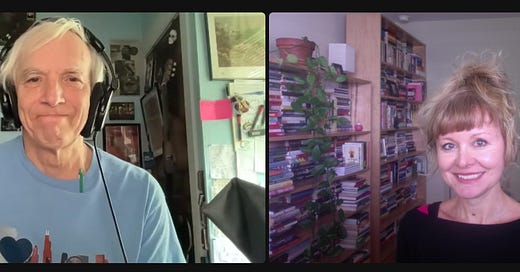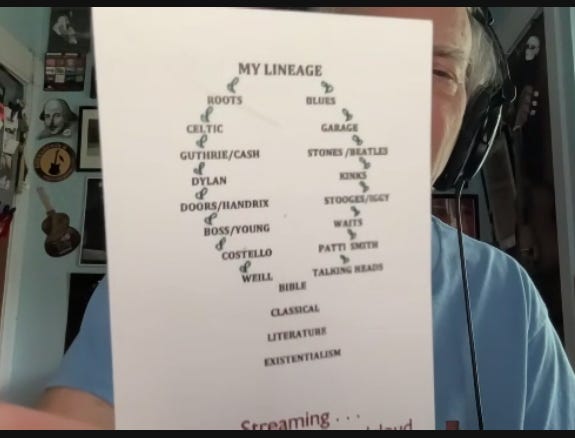The Human Heart Is Half Animal: A Conversation with Singer-Songwriter J.B. Pariah
Tell the truth but tell it slant
I met J. B. Pariah* about fifteen years ago when we were both teaching in the First-Year Writing Program at DePaul University. Our paths had intersected at faculty meetings, but I didn’t have much of an opportunity to talk with him until we each volunteered to help with the program’s Writing Showcase, an annual spring-quarter forum where students from majors across the university display their writing projects. J.B. and I both have a sweet tooth, and during showcase breaks, we loitered by the refreshment table, helping ourselves to a couple of the coconut-festooned seven-layer bars and chocolate chip cookies.
J.B. became an enthusiastic supporter of my work after reading a short story I’d published in the New England Review, along with some of my other writing—support I was grateful for, being ten years out of grad school when we became friends and unsure when (or if) I’d ever publish a book. Not long after, I experienced the writerly equivalent of a bolt from the blue when I received AWP’s Grace Paley Prize in Short Fiction and had my first book under contract.
Over the last decade and a half, J.B. has likewise shared with me some of his creative work—individual songs such as his homage to Adam Zagajewski’s poem “Try to Praise the Mutilated World,” and the scathing and witty political takedown of #45, “Trumpenstein.” Among his discography are the stellar Singer in the Rye, The Dwindling Road, and the forthcoming Dubliners Sung.
He’s like many talented artists—shy about self-promotion and more concerned with writing the next song than telling others about those he’s already written and recorded.
Last summer, J.B. began capitalizing on his retirement time by organizing and hosting literary and musical evenings in Chicago, “Themefests.” Each themefest, true to its name, focuses on a specific theme, e.g. travel, Major League Baseball’s opening day, the world of work, the overturning of Roe v. Wade, winter.
Christine: How did Themefest begin?
JB: After taking part in Bloomsday on June 16, 2022 (an annual celebration of the James Joyce novel Ulysses, organized by retired Roosevelt university literature professor Jeffery Helgeson, includes readings from the novel and musical performances**), I thought it would be worthwhile to create bimonthly, themed events at the intersection of literature and music.
Those are the two areas that have defined my life (along with family and, in my younger years, sports). With Mrs. Murphy & Sons & the Atlantic lined up as potential venues, I was able to form a sort of themefester core w/ music makers Dave Kossy & McKenna Liesman, poet Salli Berg Seeley, and light-man & photo-artist Don Seeley, and then I went about inviting other kindred spirits to come hang out, present their work to receptive ears, and generally have a good time before the ship goes down. Incidentally, no experience is necessary to present. We welcome all.
I see the themefest as not just a casual showcase for kindred artists but also an opportunity for experimentation and artistic cross-pollination: every time your antenna is up, there’s always the potential for you to create something out of it. If people look at a picture, or listen to another writer’s work, maybe it prompts something new.
My goal is for each themefest to be fun, festive, & illuminating, a place where the ivory tower meets the street. To keep them moving along, we alternate between readings and songs with interactive quizzes and comical snippets as transitions, some of them soon to come with help from ChatGPT. Opening Day, for example, was punctuated with a baseball/Cubs quiz and Yogi Berra-isms (“Nobody goes there anymore. It’s too crowded.”). Adding actual comedians is under serious consideration.
CS: When’s the next Themefest?
JB: June 2, 7:30 PM CT, Mrs. Murphy & Sons – 3905 N. Lincoln Ave (free parking in the lot that is shared with Martyr’s), and the theme is travel. Joining the usual themefesters will be Charles Edwards, the Blue Grass Group (a play on the Blue Man Group), poet Daniel Weinberg, and writer and English prof. Michele Morano, along one or two others still to be determined. I’m thinking of adding an open mic at the end for any drop-ins.
We’re also going to do some sort of Roe Rage Redux on June 24 at the Atlantic Bar & Grill (5062 N. Lincoln, 7:30 PM), with a focus on Love in the Time of Time’s Up; and I’d also like to do a Chicago birthday bash on or about August 12th that would celebrate Chicago literature and music.
CS: What/who are some of your biggest musical influences?
JB: Bob Dylan, far and away, but also Johnny Cash, various blues artists, the Stones, the Doors, Hendrix, the Kinks, Lou Reed, early Bruce Springsteen through Nebraska, Patti Smith, especially Horses, Tom Waits, Talking Heads. But I’ve also long been under the influence of classical composers from Beethoven, Mozart, Brahms, & Mahler to lesser known composers like Arvo Part and Henryk Gorecki. Movie and musical composers, too. I’m basically a magpie, building little musical nests out of whatever odds and ends that suit.
CS: What about your literary influences?
JB: Next to the window of my upstairs office where I practice on various instruments is a four-shelf bookcase heaped with Shakespeare, the Bible, literature and poetry anthologies, including a recent one on Chicago poetry, collected works of Geraldine Brooks. Dylan Thomas, Emily Dickinson, and Samuel Coleridge, among others etc. And if that’s not enough to draw inspiration from--or lift and twist from in my vernacular—I can always check out Joseph Fasano’s daily poetry threads on Twitter.
At my back are all kinds of books from fiction to non-fiction, and there’s plenty more in the basement. The trouble is they don’t come with the time to read them built in, forcing me to become more of a skimmer than I’d like. “Had we but world enough and time!”
CS: What would you say is your creative philosophy?
JB: To borrow from Dickinson and Faulkner, to tell the truth but tell it slant, a lot of it about the human heart in conflict. Though they say money is the root of all evil, I’d say the human heart is – part animal, part human – that’s where all our troubles begin. Come to think of it, the “foul rag and bone shop of the heart,” as Yeats put it, is where my songs typically start, too.
But they don’t stop there. It’s not a song until the words & music have coalesced into something as carefully focused and crafted as all the art I admire. To go back to literary influences, I’d say it's not just the writers, topics, and themes, but the disciplined and informed approach typical of anthologized poetry and prose. The closer someone looks at my work, the more they’ll see and get out of it, though I realize that if people don’t care for the music, whatever I say about the craft of it would be much ado about nothing.
CS: Your songs are frequently linguistically playful, but there are so many layers to the musicianship.
JB: Well, however many layers there are, they usually start out with either a guitar or occasionally a piano and could be performed without any adulteration, though some will come off better than others. The catch with layers is that the more you add, the more you’ll need other musicians, greater recording and editing involvement, and all the extra cost in time and money that entails. Imagine if you had to enlist new writers for segments of your novel and pay extra for every new chapter.
At some point, you’d probably switch to flash fiction (he jokes). Still, I wouldn’t do it if I didn’t think it was worth it. I especially love what other musicians bring to a song, things I couldn’t have come up with on my own. Ultimately, I try to add only as many layers as needed to enhance the song, not overwhelm it. If there’s not something honest and true once you strip off the makeup, I’ve failed.
CS: What are you working on now?
JB: Besides Dubliners Sung, I’m just about done recording an album called You Are Here & well along with one tentatively titled Wintry Mix & another titled Shakespeare in the Alley, which are songs based on Shakespeare characters like Shylock and Othello.
Two weeks ago I got a performer’s license so I’ll be a street-rocker when time and weather permit, starting at Manor Park on May 24, when maybe a few other musicians and I will celebrate Dylan’s 83rd birthday with a dozen or more of his tunes. Meanwhile, in the back of my mind, I’m trying to figure out how to turn a long novel I wrote some years back, Rain Gods Rising, into a performance piece or maybe a serial podcast or something like that. Or whether it’s even worth pursuing.
You can learn more about J.B. Pariah at here. Or you can contact him directly at jbpariah@yahoo.com.
*A stage name
**This year’s Bloomsday will be held at the Galway Arms, 2442 N.Clark St, Chicago, 7 PM, on June 16, of course! Along with featured readings from Ulysses, J.B. Pariah will perform songs from his album Dubliners Sung.








JB was very gracious with me and my part at last year’s Bloomsday celebration. It was a pleasure meeting him.